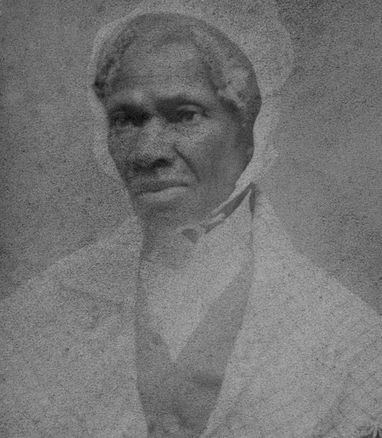
Born Isabella Baumfree in 1797, Truth was born into slavery to the Baumfree family in Swartekill, Ulster County, New York.
Truth’s time as a slave is poorly documented, despite her work as an abolitionist regularly drawing on her own negative experiences. However, what we do know is that she was sold three times in 4 years between 1806 and 1810.
It would take another 16 years before Truth would escape, with her Infant Daughter Sophia, in which she did during 1826; a year before New York State enacted the emancipation act.
Sadly, Truth had to leave her other children behind because they were not legally freed in the emancipation order until they had served as bound servants into their twenties.
She later said “I did not run off, for I thought that wicked, but I walked off, believing that to be all right.”
It would later emerge in 1827 that her previous owner, John Dumont had illegally sold her five year old son into slavery. Requiring legal help, Truth sought the expertise of the Van Wagenen family, who helped Truth take the issue to court, eventually concluding the case in 1828 after several months of legal proceedings. Truth’s victory would be hailed as the first Black woman to go to court against a White man and win the case.
Truth had a life-changing religious experience during her stay with the Van Wagenens, and became a devout Christian. In 1829 she moved with her son Peter to New York City, where she worked as a housekeeper for Elijah Pierson, a Christian Evangelist.
During her time in New York, she befriended Mary Simpson, a grocer on John Street who claimed she had once been a slave of George Washington’s. They shared an interest in charity for the poor and became intimate friends. In 1832, she met Robert Matthews, also known as Prophet Matthias, and went to work for him as a housekeeper at the Matthias Kingdom communal colony. Elijah Pierson died, and Robert Matthews and Truth were accused of stealing from and poisoning him, however both were acquitted.
The adoption of the name ‘Sojourner Truth’ would not come until 1843 whilst she was living in New York. The reason for the change of name is unknown as it was not documented, nor was it the name she took on upon her Christian Baptism.
Sojourner’s work as a Women’s rights activist is best surmised by her 1851 ‘Ain’t I A Woman?’ speech which she delivered in an impromptu style at the Ohio Women’s Rights Convention in Akron, Ohio. The speech is best known for it’s recreation using a Deep Southern accent, however this is largely considered as a satirical take on the speech as Truth held a Dutch accent, due to her first language being Dutch.
During the Civil War of 1861- 1865, Truth helped recruit black troops for the Union Army; after the war, she tried unsuccessfully to secure land grants from the federal government for former slaves.
In 2014, Truth was included in Smithsonian magazine’s list of the “100 Most Significant Americans of All Time”.
